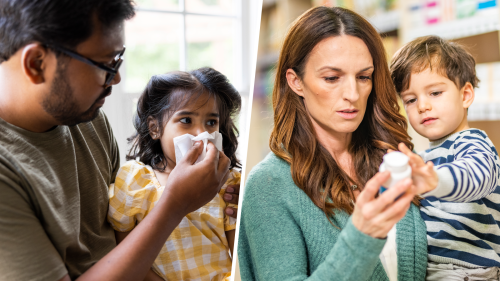Español
When a child’s sniffles & sneezing won’t go away for weeks, the cause might be allergies.
Long-lasting sneezing, with a stuffy or runny nose, could signal the presence of allergic rhinitis — the collection of symptoms that affect the nose when you have an allergic reaction to something you breathe in, & it lands on the lining inside the nose.
Allergies can be seasonal or year-round (perennial). In most parts of the U.S., plant pollens are often the cause of seasonal allergic rhinitis, more commonly called hay fever. Indoor substances — such as mold, dust mites & pet dander — can cause the perennial kind.
Up to 40% of children suffer from allergic rhinitis. & children are more likely to develop allergies if one or both parents have allergies.
The U.S. Food & Drug Administration regulates nonprescription (over-the-counter, or OTC) & prescription medicines that offer allergy relief, as well as allergen extracts used to diagnose & treat allergies. Take care to read & follow the directions provided when giving any medicine to children, including these products.
Allergy: The Body’s Reaction to Allergens
An allergy is the body’s reaction to a usually harmless substance, or allergen. Our immune system responds to the invading allergen by releasing histamine & other chemicals that typically trigger symptoms in the nose, lungs, throat, sinuses, ears, eyes or skin.
In some children, allergies can also trigger symptoms of asthma, a disease that causes wheezing or difficulty breathing. If a child has allergies & asthma, not controlling the allergies can make asthma worse.
Avoid Pollen, Mold & Other Allergy Triggers
If your child has seasonal allergies, pay attention to pollen counts & try to keep your child inside when the levels are high.
Keep in mind:
- In late summer & early fall, during ragweed pollen season, pollen levels are highest in the morning.
- In spring & summer, during the grass pollen season, pollen levels are highest in the evening.
- Some molds, another allergy trigger, may also be seasonal. For example, leaf mold is more common in fall.
- Sunny, windy days can be especially troublesome for pollen allergy sufferers.
It may help to keep windows closed in your house & car & run the air conditioner.
Allergy Medicines for Children
For most children, symptoms may be controlled by avoiding the allergen, if known, & using nonprescription medicines. But if a child’s symptoms are persistent & not relieved by nonprescription medicines, see a health care professional.
Always read the product label to make sure a medication is right for your child’s age. Some OTC allergy medicines are approved for children as young as 6 months — but not all. Just because a product’s box says it’s intended for children, doesn’t mean it is intended for children of all ages.
If your child is taking more than one medication, read the label to be sure that the active ingredients aren’t the same. Different products marketed to treat different symptoms might still have the same active ingredient. The result: Your child might be taking too much of one type of medicine.
Children are more sensitive than adults to many drugs. For example, some antihistamines can have harmful side effects at lower doses in young patients, causing excitability or excessive drowsiness.
If you have questions about any medication, contact the FDA’s Division of Drug Information at 1-855-543-3784 & 1-301-796-3400, or [email protected]. Our pharmacists are experts at interpreting information for the public.
Allergy Shots & Children
Children who don’t respond to other nonprescription or prescription medications, or who suffer from frequent complications of allergic rhinitis, may be candidates for allergen immunotherapy, commonly known as allergy shots.
After allergy testing, typically by skin testing to detect what allergens your child may react to, a health care professional injects the child with “extracts,” small amounts of the allergens that trigger a reaction. The doses are gradually increased so that the body builds up immunity to these allergens. Allergen extracts are manufactured from natural substances, such as pollens, insect venoms, & animal hair. More than 1,200 extracts are licensed by the FDA.
In the last 20 years, there has been a remarkable transformation in allergy treatments. Children used to be miserable for months out of the year, & drugs made them incredibly sleepy. Today’s products offer proven approaches for relief of seasonal allergy symptoms.
Source: FDA Consumer Updates

